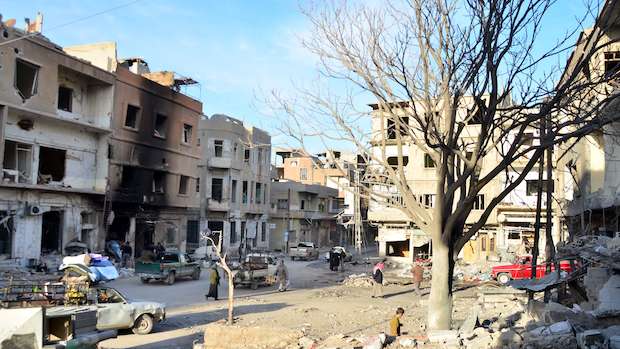Beirut, Asharq Al-Awsat—Syrian opposition activists claimed on Monday that fighters from Iraqi Shi’ite militias were playing a leading role in the Syrian government’s battle to recapture the town of Yabroud.
One activist, who did not want to be named, said Iraqi fighters are “leading the attack in the battle to control the town of Yabroud after the substantial decline in the number of Hezbollah fighters.”
“Iraqi fighters led the attack on Yabroud with some 3,000 men,” he added.
These claims come at a time when Iraqi authorities continue to deny that they are sending fighters to defend Shi’ite religious shrines in Syria, such as the Sayyida Zainab Mausoleum. However, Shi’ite groups including Hezbollah and Asa’ib Ahl Al-Haq have said that they see no reason to stop fighters going to Syria if their task were limited to the defense of Shi’ite shrines.
An official spokesman of Asa’ib Ahl Al-Haq in Iraq, Ahmad Al-Kanani, told Asharq Al-Awsat: “Sheikh Qais Al-Khaz’ali [head of Asa’ib Ahl Al-Haq] stressed the importance of defending the Islamic shrines in Syria against takfirists, which is the duty of every Muslim, Shi’ite or Sunni, in a speech on the anniversary of the establishment of the group. The aim is to ensure takfirists are rejected by all, and to avert the dangers of sectarian sedition.”
“There is an important precedent, which is the Samarra bombing in 2006, when the ‘tombs of the two imams’ were destroyed, and which resulted in sectarian strife for Iraqi people, he continued. “We do not want a repeat of that tragedy . . . If the Sayyida Zainab Mausoleum was destroyed, it would start sectarian violence that would spread to Iraq and have dangerous repercussions.”
Kanani said his party “did not send or ask anyone to go there [to Syria], save those who wanted to go.” He added: “Members of the Abu Al-Fadl Abu Al-Abbas Brigade that is fighting in Syria are not affiliated to one specific group; it includes members of many different groups.”
The Abu Al-Fadl Abu Al-Abbas Brigade is one of the most prominent Shi’ite militias fighting in Syria. They appeared in Damascus at the beginning of winter 2012, and are reportedly well-trained and equipped and are very effective in urban combat. They also have a clear military command structure and coordinate closely with Syrian government forces.
Iraqi Foreign Minister Hoshyar Zebari also said in a recent press interview that reports of Iraqi fighters in Syria have been exaggerated.
Zebari said a number of Iraqis had travelled to Syria, but said they had done so without permission from the Iraqi government or its political leaders.
The director of the Syrian opposition’s Qalamoun Media Bureau, Amer Al-Qalamouni, told Asharq Al-Awsat that the Iraqi fighters on the outskirts of Yabroud were members of the the Dhu Al-Fiqar Brigade, the Abu Al-Fadl Abu Al-Abbas Brigade, and the Badr Organization.
He said the Badr Organization “is taking the lead in the field in the number of fighters, now over 1,000 men, after it arrived in Syria recently.”
Qalamouni quoted Syrian government military sources that around “2,000 fighters from the Badr Organization arrived in Syria on Saturday to fight alongside the Syrian government forces.” He added that “a large number of them were transferred to Yabroud to participate in the fighting. They can be recognized by the black uniform they wear.”
Iraqi fighters “have become a strong force in the attack on Yabroud following a 70 percent decline in the number of Hezbollah fighters,” he said.
He said the decline in Hezbollah fighters was due to differences among them and the controversy surrounding Hezbollah’s intervention in Syria, as well as the suicide attacks on Hezbollah strongholds in Lebanon.
On the other hand, a source close to the Badr Organization speaking on the condition of anonymity told Asharq Al-Awsat that the Iraqi fighters were not affiliated to Badr Organization and that they were “a group of Iraqis who were eager to defend the religious shrines in Syria, and who travelled to Syria with the help of unknown parties in order to protect the religious shrines.”

